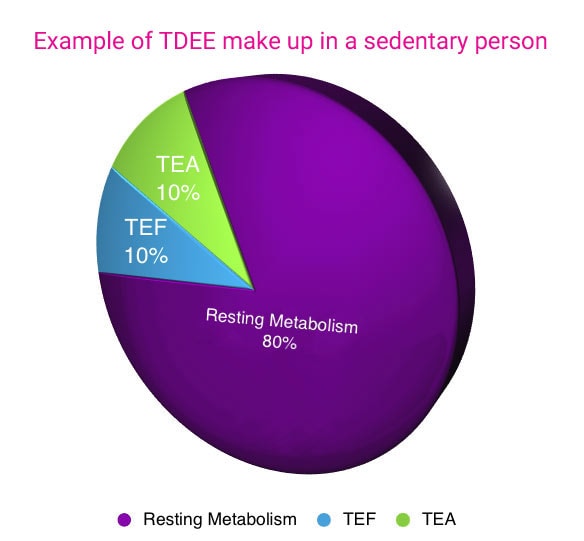TDEE Calculator
Total Daily Energy Expenditure (TDEE) calculator
Use our free TDEE calculator below to calculate your TDEE and find out how many calories your body needs.
What is TDEE and why does it matter?
Total Daily Energy Expenditure (TDEE), is a measure of how many calories you burn every day. Because it takes exercise and movement into account, it gives a more actionable result. And our TDEE calculator works out your Basal Metabolic Rate, then adds the calories burned through movement and exercise. So, your TDEE is all the calories you burn in a day from eating, sleeping, fidgeting, moving and exercising. Another way of looking at it is that it’s the number of calories your body needs to maintain its current weight. And if you eat less than your TDEE you will lose weight.
How the TDEE calculator works
It’s important to adjust the numbers upwards to account for the calories you burn during the day. This is because your BMR only represents the number of calories your body burns when at rest. Therefore, even if you lead a sedentary lifestyle, you’ll burn extra calories when you stand, or sit and walk from one room to another.
Hence our TDEE calculator uses accurate formulas and presents your result instantly for free. So, you can be confident there’s no need to sign up or pay for your results.
How Total Daily Energy Expenditure is made up
 Our TDEE calculator result is comprised of three major components:
Our TDEE calculator result is comprised of three major components:
- Resting metabolic rate (RMR or BMR) ~56-80%.
– The energy your body needs to perform the most basic functions when at rest. Your thyroid hormone and lean body mass will affect this result. - Thermic effect of feeding (TEF).
– The energy your body expends above the resting metabolic rate from processing your food for use and storage. You can affect this by choosing a high protein eating plan. And by eating little and often. - Thermic effect of activity (TEA).
– This accounts for roughly 10 to 30 percent of the energy you use in a day, depending on how active you are. And, depending on the intensity and duration of the activity, this metabolic boost can linger for hours after exercise. Because it continues, even when you’re at rest, this is a huge weight-loss benefit of exercise. Also, it’s thought that the more vigorous the excerise, the greater the effect.
And if you’re interested in the formula itself, a multiplier can be applied to BMR. This article shows how the Harris Benedict formula can be used to determine Total Energy Expenditure with a multiplier.
How to use your TDEE calculator results
Once you know your TDEE, you know how much energy your body needs to maintain its current weight. With this knowledge you can plan your weight loss for better results. This is particularly important if you are planning the calorie deficit you’ll need for a particular rate of weight loss. If you have a TDEE of 1800 and want to lose 2lbs weekly, what should your plan be? In this case, you’d either have to eat only 800 calories a day, or increase your energy expenditure with exercise. Or you may decide that a more achievable goal is to lose 1lb a week and eat 1300 calories a day.
Because it feels like you need a degree in maths to do this, our diet planner calculates all this for you quickly and easily.
What’s the difference between TDEE, BMR and RMR?
It can be confusing with all these acronyms, when all you want to do is go on a diet. It seems like too much hassle sometimes, but this information can really help you achieve your goals a bit quicker. So, it’s worth taking a bit of time to understand the differences and how they affect you.
Your BMR or RMR are so similar in their definition, that they essentially are the same. Hence they can be interchangable as both tell you the amount of calories you body needs to exist. But because everyone does more than just exist, often, your BMR only paints part of the picture. BMR is the first step of a calculation to help you understand the calories your body needs. As we’ve already explained, it’s your TDEE that gives you the whole picture, because it tells you how many calories you use in your lifestyle. Because it includes your BMR as well as your movement and exercise, your TDEE is a more accurate and usable result.
Can you change your TDEE?
In comparison to your BMR, which is very difficult to change, you can control your TDEE fairly easily. Since your TDEE is concerned with activity and movement, move more and exercise more – and harder – and you can increase your TDEE. You can also make gains by eating more protein and little and often. Especially relevant, is that most successful dieters combine eating less and moving more in their daily routines.
So, it’s probably worth thinking about how you can incorporate more movement and exercise in your day.
Conclusion
In conclusion, although you can lose weight without knowing your TDEE, using our TDEE calculator could make it easier. Especially if you want to control the speed of your results.
What next?
Once you know your TDEE, you can start planning your diet. Use our other calculators to find out your ideal weight, body shape and frame size and, when you’re ready, use our diet planner to see how long it will take to reach your desired weight.
